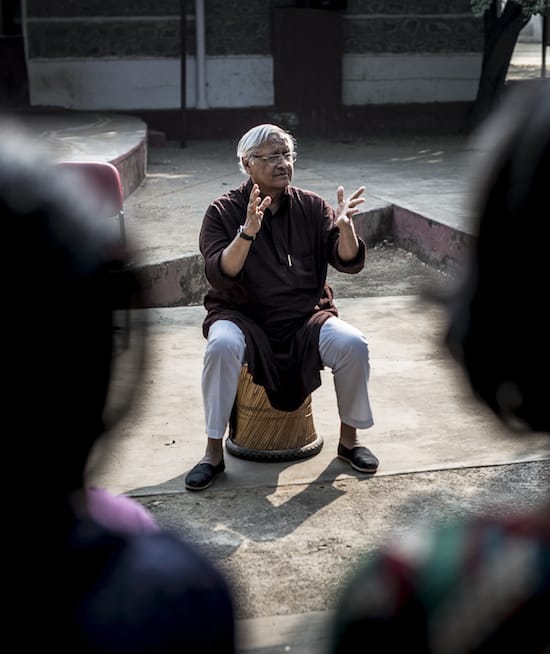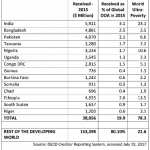Rural Knowledge Meets Tech Innovation: What Ultra-Poor Entrepreneurs Can Teach the World
Sanjit “Bunker” Roy started Barefoot College in a rural, poverty-stricken Indian outpost about the same time Steve Jobs cooked up a company called Apple in a Bay Area garage. The two couldn’t be more different and farther away. Yet the genius that emerged from both – rural knowledge combined with innovative technology – now empowers thriving entrepreneurs among the ultra-poor all over the Southern Hemisphere.
For most of these budding entrepreneurs coming through the Barefoot College in India or its regional centers developing in Africa and Latin America, their training begins as solar engineers. They are uneducated (many are illiterate), female and exist at the base of the socioeconomic pyramid, all from remote outposts in the poorest places on earth.
“We tap into the talent inherent in the poorest people of the world – the ultra-poor as they are called – who live on less than $1.50 a day,” says Sue Stevenson, director of strategic partnerships and international development at Barefoot College.
Once trained at Barefoot College, these women receive the knowledge, equipment and resources needed to install solar panels and lighting fixtures that illuminate their communities. All totaled, Barefoot Solar engineers operate businesses in more than 80 countries on four continents.
But the solar engineer curriculum is just the start. Barefoot “professionals” launch businesses in dozens of specialities that range from medicine to honey production, low tech to high tech, retail to sustainable development.
“Just because someone is illiterate doesn’t mean she cannot become an engineer or architect,” says Roy. “The idea was to bring out the knowledge, skills and wisdom of very ordinary people who have so much to give for their own development. At Barefoot College, we are providing that space. ”
‘Appropriate’ technologies

Sanjit “Bunker” Roy, founder of Barefoot College.
They start at the village level to begin implementing the entrepreneurship model that Barefoot has perfected over 45 years, traversing the globe to remote outposts. Barefoot team members meet with village elders who help identify trainees who will study at Barefoot. The village invests in their success, almost like a “friends and family” round of a Silicon Valley tech start-up.
Barefoot respects the rural knowledge that reaches deep into the people and places where they work. By tapping into experiential learning, participants can apply their natural talents to learning new skills, many of which involve sophisticated technology, like solar power and tablet devices. But they are placed into the hands of the rural poor and used in ways that augment and enhance village life.
“Appropriate technologies mitigate dependency on outside agencies and safeguard against exploitation,” Stevenson says.
After graduating from a comprehensive six-month program, Barefoot College solar engineers return to their home villages and launch their solar power businesses. They solar electrify their villages, which mitigates the expensive and environmentally hazardous practice of burning kerosene. Occasionally, depending on the climate, they’ll also install solar water heaters to improve the quality of life.
Barefoot’s evolving solar R&D team assists with ongoing introductions of digital technology powered by Barefoot solar-powered projectors and other off-grid solutions. Education improves and offers new entry points for children left behind. Children often start schooling at night under the solar lights these women install.
These small businesses impact and improve many facets of rural life among the poor. The women who run them, once marginalized, are now empowered and esteemed.
“We can teach our families and communities what we have learned at the center,” says solar engineer Subira Haji Juma.
Other entrepreneurship options
When the United Nations announced its 17 top priorities for the planet by the year 2030, they might as well have been describing Barefoot, whose innovative approach to combating extreme poverty ripples out with proven impact across most of these grand global goals.
Beyond obvious impact in areas like poverty alleviation, environmental impact and women’s empowerment, Barefoot’s entrepreneurship creates self-sufficiency throughout the communities it works with. Collectively, Barefoot College participants are crafting a playbook of empowerment that can offer instruction to the broader global development community.
The entrepreneurship model extends far beyond the solar engineers. Barefoot Zanzibar makes and markets its own honey. Indian craftspeople market their wares on an online store. And new pilot projects in coffee production will create entrepreneurship opportunities for the women trained at Barefoot College and regional centers around the world. Coffee growers in Guatemala will be trained on global markets and how to roast coffee using Barefoot’s solar-powered roasters to help fuel new businesses for several of the Barefoot College trainees.
“Who is a professional?” Roy asks. “A professional is someone who has a combination of competence, confidence and belief. A water diviner is a professional. A traditional midwife is a professional. A traditional bone setter is a professional. These are professionals all over the world. You find them in any inaccessible village around the world.”
From uneducated to entrepreneurs
Rekha hails from Kalbaliya, a nomadic and highly marginalized community in India. She is one of nine children in the family. She never went to a school. She came to Barefoot College in 2016 as part of a 10-month young entrepreneur training program that taught employable skills in carpentry, sewing, handicrafts and solar electricity. Complementary subjects of Hindi, math and computer training were also required.
Rekha was in a class of 18 others like her, ages 15 to 20. Unlike the solar training of women, this program allows for both boys and girls. Each was paid 3,000 rupees (roughly $47) each month, of which 1,000 were sent home and 2,000 were saved. Upon graduation, Rekha and her classmates had saved 20,000 rupees each.
“They can go back to their community and start their own enterprise,” said project manager Aakash Piplani. “They don’t have to ask their parents or depend on them. They have money. They can start their enterprise the day they want.”
Rekha learned to sew along with basic math and Hindi. She has done so well she is going to join India’s public education system and finish her schooling, while working to start her own business. She will be the first girl from her community to go to a state school, Piplani said, and these budding entrepreneurs will eventually change their entire communities.
“The biggest benefit is they are becoming the local heroes in their communities,” he added. “They have a degree of independence when they go back to the villages. They can overcome the problem of unemployment and underemployment.”
On the day of graduation at Barefoot College, all the products students made during their training were sold, earning a total of 50,000 rupees.
“Most of these were bought by the villagers themselves, and they were appreciated,” Piplani said.
A Destined Partnership
The innovations of a Bunker Roy in rural India and a Steve Jobs in suburban America couldn’t be more different, and yet they are similar. The values of both in many ways form the emergence of a new kind of entrepreneur, one who has much to teach the world about how to save itself. The unlikely pairing of historical, cultural knowledge and modern, appropriate technologies forms the bedrock of much of the entrepreneurial path Barefoot uses to improve the life of the ultra-poor.
So perhaps it was destiny that these two very different legacy organizations – a top global technology company and a leading NGO – would finally come together, a relationship formalized in 2015. Barefoot formed a partnership with Apple India to integrate digital technology into rural solar night schools in a pilot program across three states: Rajasthan, Bihar and Karnataka. This partnership produced unprecedented results and a call from eight additional states to take this model to scale.
Consider: This pilot project trained 18 female entrepreneurs who solar-electrified 1,100 homes in 33 different villages. The entrepreneurs earned steady income that saw them rise in economic and community standing.
Furthering the impact, Barefoot College launched three digital night schools after these communities had solar lighting. The marriage of rural knowledge and technology informs the educational program.
First, the school uses tablets and solar-powered projectors in rural districts to enhance learning. Once integrated, these tools remain in schools to further disseminate information about children’s rights and civil society.
This revolutionary partnership has opened doors to new learning experiences and opportunities to share and connect in ways never before possible for rural communities.
“Barefoot College is where we want you to try crazy ideas. Whatever idea you have, come and try it. It doesn’t matter if you fail. Battered, bruised, you start again,” Roy said, describing both the spirit of Barefoot College and the spirit of an entrepreneur – no matter where that spirit is born.
Scot Bolsinger is a senior partner of Off Road.
Photos courtesy of Barefoot College
- Categories
- Education, Technology



